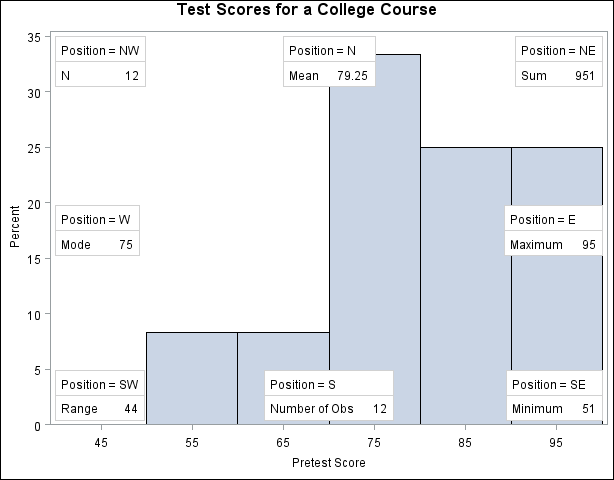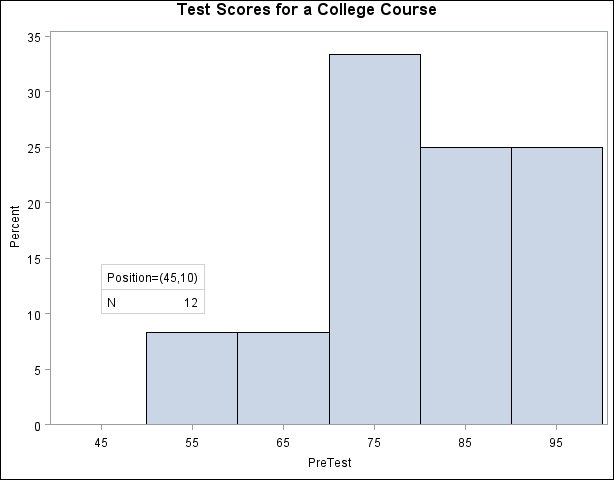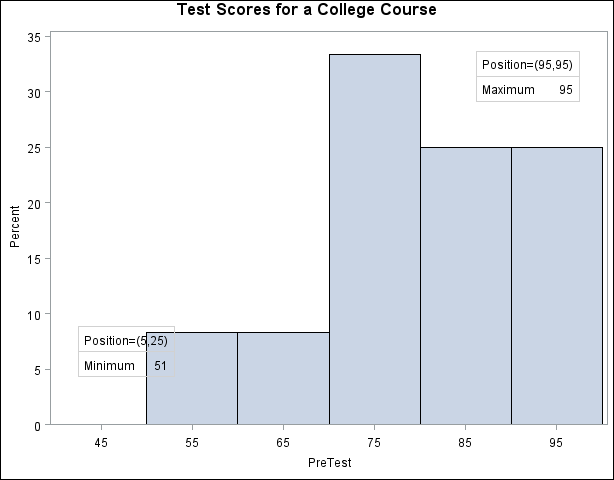The UNIVARIATE Procedure
- Overview
-
Getting Started

-
Syntax

-
Details
 Missing Values Rounding Descriptive Statistics Calculating the Mode Calculating Percentiles Tests for Location Confidence Limits for Parameters of the Normal Distribution Robust Estimators Creating Line Printer Plots Creating High-Resolution Graphics Using the CLASS Statement to Create Comparative Plots Positioning Insets Formulas for Fitted Continuous Distributions Goodness-of-Fit Tests Kernel Density Estimates Construction of Quantile-Quantile and Probability Plots Interpretation of Quantile-Quantile and Probability Plots Distributions for Probability and Q-Q Plots Estimating Shape Parameters Using Q-Q Plots Estimating Location and Scale Parameters Using Q-Q Plots Estimating Percentiles Using Q-Q Plots Input Data Sets OUT= Output Data Set in the OUTPUT Statement OUTHISTOGRAM= Output Data Set OUTKERNEL= Output Data Set OUTTABLE= Output Data Set Tables for Summary Statistics ODS Table Names ODS Tables for Fitted Distributions ODS Graphics Computational Resources
Missing Values Rounding Descriptive Statistics Calculating the Mode Calculating Percentiles Tests for Location Confidence Limits for Parameters of the Normal Distribution Robust Estimators Creating Line Printer Plots Creating High-Resolution Graphics Using the CLASS Statement to Create Comparative Plots Positioning Insets Formulas for Fitted Continuous Distributions Goodness-of-Fit Tests Kernel Density Estimates Construction of Quantile-Quantile and Probability Plots Interpretation of Quantile-Quantile and Probability Plots Distributions for Probability and Q-Q Plots Estimating Shape Parameters Using Q-Q Plots Estimating Location and Scale Parameters Using Q-Q Plots Estimating Percentiles Using Q-Q Plots Input Data Sets OUT= Output Data Set in the OUTPUT Statement OUTHISTOGRAM= Output Data Set OUTKERNEL= Output Data Set OUTTABLE= Output Data Set Tables for Summary Statistics ODS Table Names ODS Tables for Fitted Distributions ODS Graphics Computational Resources -
Examples
 Computing Descriptive Statistics for Multiple Variables Calculating Modes Identifying Extreme Observations and Extreme Values Creating a Frequency Table Creating Plots for Line Printer Output Analyzing a Data Set With a FREQ Variable Saving Summary Statistics in an OUT= Output Data Set Saving Percentiles in an Output Data Set Computing Confidence Limits for the Mean, Standard Deviation, and Variance Computing Confidence Limits for Quantiles and Percentiles Computing Robust Estimates Testing for Location Performing a Sign Test Using Paired Data Creating a Histogram Creating a One-Way Comparative Histogram Creating a Two-Way Comparative Histogram Adding Insets with Descriptive Statistics Binning a Histogram Adding a Normal Curve to a Histogram Adding Fitted Normal Curves to a Comparative Histogram Fitting a Beta Curve Fitting Lognormal, Weibull, and Gamma Curves Computing Kernel Density Estimates Fitting a Three-Parameter Lognormal Curve Annotating a Folded Normal Curve Creating Lognormal Probability Plots Creating a Histogram to Display Lognormal Fit Creating a Normal Quantile Plot Adding a Distribution Reference Line Interpreting a Normal Quantile Plot Estimating Three Parameters from Lognormal Quantile Plots Estimating Percentiles from Lognormal Quantile Plots Estimating Parameters from Lognormal Quantile Plots Comparing Weibull Quantile Plots Creating a Cumulative Distribution Plot Creating a P-P Plot
Computing Descriptive Statistics for Multiple Variables Calculating Modes Identifying Extreme Observations and Extreme Values Creating a Frequency Table Creating Plots for Line Printer Output Analyzing a Data Set With a FREQ Variable Saving Summary Statistics in an OUT= Output Data Set Saving Percentiles in an Output Data Set Computing Confidence Limits for the Mean, Standard Deviation, and Variance Computing Confidence Limits for Quantiles and Percentiles Computing Robust Estimates Testing for Location Performing a Sign Test Using Paired Data Creating a Histogram Creating a One-Way Comparative Histogram Creating a Two-Way Comparative Histogram Adding Insets with Descriptive Statistics Binning a Histogram Adding a Normal Curve to a Histogram Adding Fitted Normal Curves to a Comparative Histogram Fitting a Beta Curve Fitting Lognormal, Weibull, and Gamma Curves Computing Kernel Density Estimates Fitting a Three-Parameter Lognormal Curve Annotating a Folded Normal Curve Creating Lognormal Probability Plots Creating a Histogram to Display Lognormal Fit Creating a Normal Quantile Plot Adding a Distribution Reference Line Interpreting a Normal Quantile Plot Estimating Three Parameters from Lognormal Quantile Plots Estimating Percentiles from Lognormal Quantile Plots Estimating Parameters from Lognormal Quantile Plots Comparing Weibull Quantile Plots Creating a Cumulative Distribution Plot Creating a P-P Plot - References
| Positioning Insets |
Positioning an Inset Using Compass Point Values
To position an inset by using a compass point position, specify the value N, NE, E, SE, S, SW, W, or NW with the POSITION= option. The default position of the inset is NW. The following statements produce a histogram to show the position of the inset for the eight compass points:
data Score; input Student $ PreTest PostTest @@; label ScoreChange = 'Change in Test Scores'; ScoreChange = PostTest - PreTest; datalines; Capalleti 94 91 Dubose 51 65 Engles 95 97 Grant 63 75 Krupski 80 75 Lundsford 92 55 Mcbane 75 78 Mullen 89 82 Nguyen 79 76 Patel 71 77 Si 75 70 Tanaka 87 73 ;
title 'Test Scores for a College Course';
ods graphics off;
proc univariate data=Score noprint;
histogram PreTest / midpoints = 45 to 95 by 10;
inset n / cfill=blank
header='Position = NW' pos=nw;
inset mean / cfill=blank
header='Position = N ' pos=n ;
inset sum / cfill=blank
header='Position = NE' pos=ne;
inset max / cfill=blank
header='Position = E ' pos=e ;
inset min / cfill=blank
header='Position = SE' pos=se;
inset nobs / cfill=blank
header='Position = S ' pos=s ;
inset range / cfill=blank
header='Position = SW' pos=sw;
inset mode / cfill=blank
header='Position = W ' pos=w ;
label PreTest = 'Pretest Score';
run;

Positioning Insets in the Margins
To position an inset in one of the four margins that surround the plot area, specify the value LM, RM, TM, or BM with the POSITION= option. Margin positions are recommended if you list a large number of statistics in the INSET statement. If you attempt to display a lengthy inset in the interior of the plot, the inset is likely to collide with the data display.
Positioning an Inset Using Coordinates
To position an inset with coordinates, use POSITION=(x,y). You specify the coordinates in axis data units or in axis percentage units (the default). Note: You cannot position an inset with coordinates when producing ODS Graphics output.
If you specify the DATA option immediately following the coordinates, PROC UNIVARIATE positions the inset by using axis data units. For example, the following statements place the bottom left corner of the inset at 45 on the horizontal axis and 10 on the vertical axis:
title 'Test Scores for a College Course';
ods graphics off;
proc univariate data=Score noprint;
histogram PreTest / midpoints = 45 to 95 by 10;
inset n / header = 'Position=(45,10)'
position = (45,10) data;
run;

By default, the specified coordinates determine the position of the bottom left corner of the inset. To change this reference point, use the REFPOINT= option (see below).
If you omit the DATA option, PROC UNIVARIATE positions the inset by using axis percentage units. The coordinates in axis percentage units must be between 0 and 100. The coordinates of the bottom left corner of the display are (0,0), while the upper right corner is (100, 100). For example, the following statements create a histogram and use coordinates in axis percentage units to position the two insets:
title 'Test Scores for a College Course';
ods graphics off;
proc univariate data=Score noprint;
histogram PreTest / midpoints = 45 to 95 by 10;
inset min / position = (5,25)
header = 'Position=(5,25)'
refpoint = tl;
inset max / position = (95,95)
header = 'Position=(95,95)'
refpoint = tr;
run;
The REFPOINT= option determines which corner of the inset to place at the coordinates that are specified with the POSITION= option. The first inset uses REFPOINT=TL, so that the top left corner of the inset is positioned 5% of the way across the horizontal axis and 25% of the way up the vertical axis. The second inset uses REFPOINT=TR, so that the top right corner of the inset is positioned 95% of the way across the horizontal axis and 95% of the way up the vertical axis.

A sample program for these examples, univar3.sas, is available in the SAS Sample Library for Base SAS software.